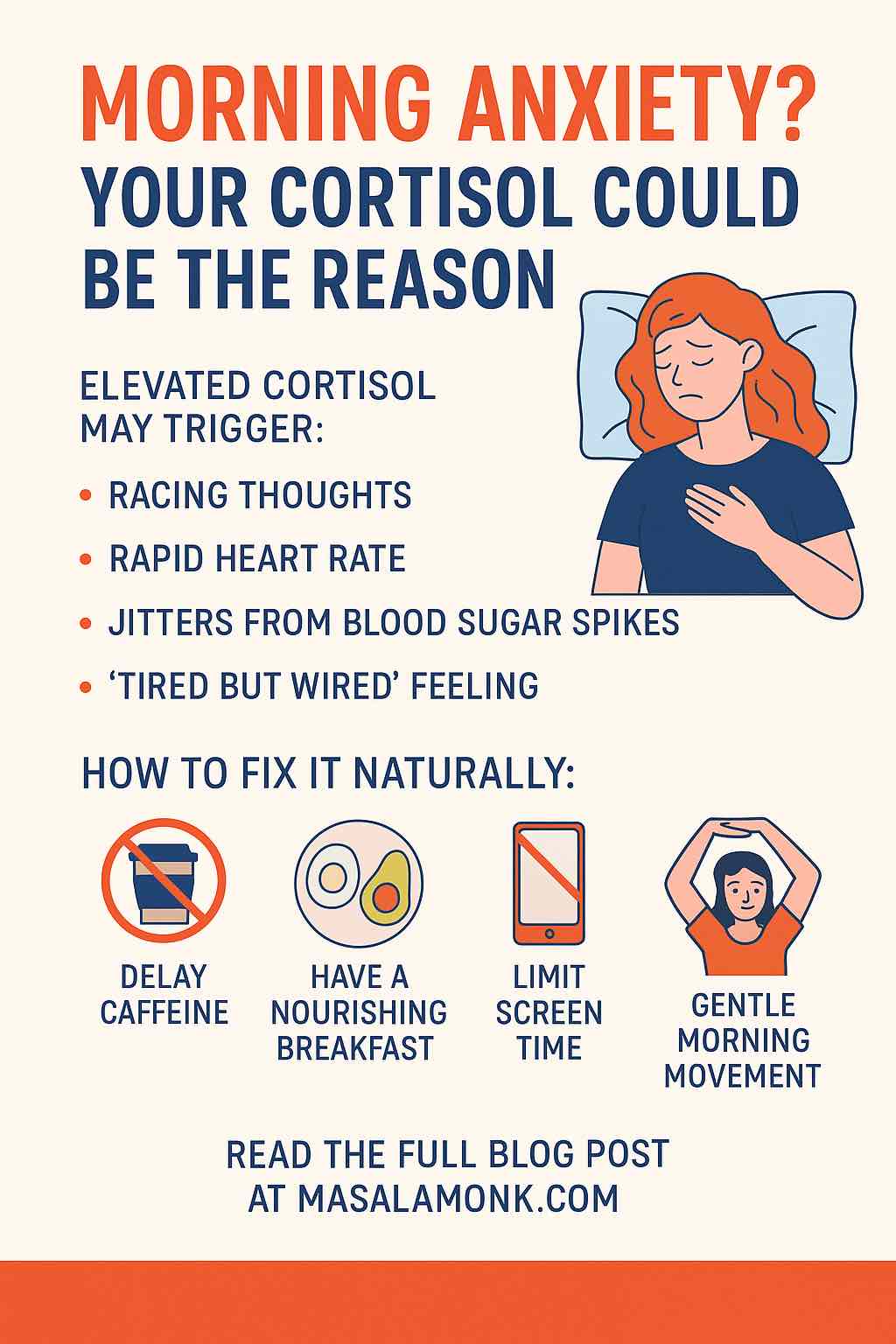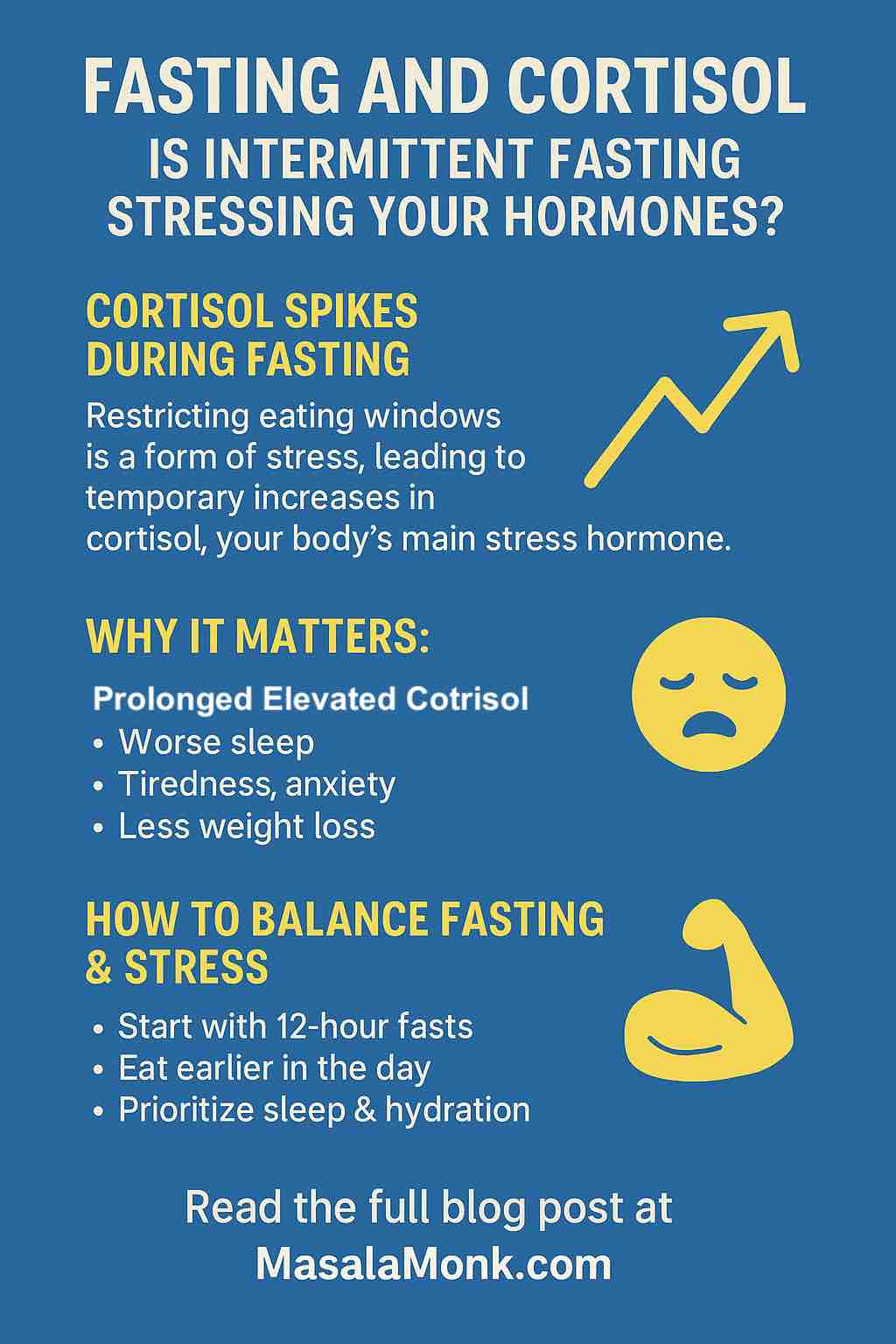
Ever wake up feeling like your heart is racing, your mind’s in overdrive, and you’re already behind—before your feet even hit the floor?
That, right there, could be morning anxiety, and cortisol—your body’s primary stress hormone—may be playing a major role.
In this post, we’ll break down why cortisol rises in the morning, how it connects to your anxiety, and most importantly, natural strategies to rebalance your mornings and reset your nervous system.
☀️ First, What Is Cortisol and Why Is It High in the Morning?
Cortisol follows a natural circadian rhythm. It begins to rise while you’re still sleeping, peaking around 30–45 minutes after waking in what’s called the Cortisol Awakening Response (CAR). This isn’t a bad thing—it’s designed to:
- Wake you up
- Get your brain alert
- Mobilize energy for the day ahead
But in today’s fast-paced, overstimulated world, this normal rise can become amplified, especially if you’re already stressed, underslept, or anxious about the day ahead. That’s when morning anxiety kicks in.
😰 How Does Cortisol Cause Morning Anxiety?
When cortisol rises too much or too quickly, it can lead to:
- Racing thoughts
- Increased heart rate
- Muscle tension
- Digestive discomfort
- Feelings of dread, panic, or urgency
And because cortisol can also raise blood sugar, you may feel jittery, lightheaded, or hungry—fueling the anxiety loop even more.
But here’s the twist: it’s not just cortisol’s fault.
Morning anxiety is usually the result of multiple overlapping triggers, including:
- Poor sleep
- Skipping meals (especially breakfast)
- Checking your phone immediately after waking
- Caffeine too early
- Generalized stress or “anticipatory worry”
Let’s unpack how to fix it naturally.
🛠️ 6 Practical Ways to Fix Morning Anxiety (Naturally)
✅ 1. Delay Your Caffeine Intake
Coffee right after waking may feel like survival—but it’s not ideal for your stress hormones. Since your cortisol is naturally peaking in the first hour after waking, adding caffeine can cause it to spike even higher, worsening anxiety.
💡 Related: Coffee and Cortisol: How Your Daily Brew Impacts Stress, Weight, and Well-Being
Try this instead:
- Drink water or herbal tea (like tulsi or chamomile) first thing.
- Wait at least 60–90 minutes before your first cup of coffee.
✅ 2. Eat a Cortisol-Calming Breakfast
Many people skip breakfast while juggling busy mornings—or follow intermittent fasting. But doing so can prolong cortisol elevation and leave you feeling wired but tired.
💡 Related: Fasting and Cortisol: Is Intermittent Fasting Stressing Your Hormones?
Instead, aim for a balanced breakfast with:
- Protein (e.g., eggs, Greek yogurt, nut butter)
- Healthy fats (e.g., avocado, seeds)
- Slow carbs or fiber (e.g., oats, fruit, whole grains)
This helps stabilize blood sugar and reduces cortisol-driven crashes later in the day.
✅ 3. Avoid Screens for the First 30 Minutes
Your phone is a cortisol trigger. When you check emails, texts, or news feeds immediately upon waking, you tell your nervous system, “The world is on fire 🔥 — react!”
Try this instead:
- Leave your phone in another room overnight
- Start your day with 5–10 minutes of deep breathing, journaling, or a short walk
- Use a real alarm clock if needed
This small boundary can dramatically lower morning anxiety over time.
✅ 4. Move Your Body Gently
Light movement helps your cortisol follow its natural rhythm and signals your body that you’re safe. This can shift your nervous system out of fight or flight and into rest and digest.
Try:
- A 10-minute morning walk
- Gentle yoga or stretching
- Dancing to your favorite song
Bonus: Sunlight exposure in the morning helps regulate cortisol and improves sleep quality at night.
✅ 5. Incorporate Cortisol-Calming Drinks
What you drink in the morning matters.
Instead of defaulting to coffee or sugary energy drinks, try these stress-reducing options:
💡 Related: 5 Soothing Drinks to Help Lower Cortisol and Calm Your Mind
Great choices include:
- Chamomile or tulsi tea
- Lemon water with sea salt
- Ashwagandha or reishi mushroom tea
✅ 6. Use Food, Not Willpower, to Balance Stress Hormones
Cortisol can stay elevated if your body feels starved or deprived—even if you’re eating clean.
Use functional foods to help lower baseline cortisol over time:
💡 Related:
Top cortisol-lowering foods include:
- Dark leafy greens
- Fatty fish (like salmon or sardines)
- Nuts and seeds
- Fermented foods for gut health
- Magnesium-rich foods (banana, cacao, avocado)
🚨 Signs You Might Be Experiencing Cortisol-Driven Morning Anxiety
Not sure if cortisol is behind your anxiety? Look for these signs:
- You wake up anxious without any specific reason
- You feel better after eating or moving
- You get tired but wired at night
- You sleep 7+ hours but still feel unrested
- You have mid-section weight gain, even with diet/exercise
🧘♀️ You Don’t Have to Wake Up Anxious Anymore
Morning anxiety doesn’t mean you’re broken or weak—it often means your cortisol rhythm is out of sync with your lifestyle. The good news? You can absolutely reset it with small, consistent changes.
Remember, your morning doesn’t have to start with panic.
It can start with calm, clarity, and control.
🔗 More Cortisol Resources You’ll Love
- Coffee and Cortisol: How Your Brew Affects Stress, Weight & Energy
- 5 Soothing Drinks to Help Lower Cortisol and Calm Your Mind
- Fasting and Cortisol: Is Intermittent Fasting Stressing Your Hormones?
- Diet Strategies to Lower Cortisol Levels
- 5 Foods That Naturally Decrease Cortisol
- 10 Symptoms of High Cortisol Levels in Females
🙋♀️ FAQs: Morning Anxiety & Cortisol — What You Need to Know
1. Why do I feel anxious as soon as I wake up?
This may be due to your natural cortisol awakening response (CAR), which peaks 30–45 minutes after waking. If your stress levels are already high, this cortisol spike can feel like anxiety or panic.
2. Is cortisol the only reason for morning anxiety?
Not always. While cortisol contributes, other factors like poor sleep, low blood sugar, high anticipatory stress, or excessive phone use upon waking also play key roles.
3. How can I tell if cortisol is causing my morning anxiety?
You might notice you feel:
- Jittery or wired before eating
- Calmer after breakfast or light movement
- Anxious without clear emotional triggers
These may point to a cortisol-driven response.
4. Can coffee make morning anxiety worse?
Yes. Drinking caffeine right after waking (when cortisol is naturally highest) can amplify the stress response. Waiting 60–90 minutes to drink coffee may reduce this effect.
5. What’s the best breakfast for managing morning anxiety?
A breakfast rich in protein, healthy fats, and fiber can stabilize blood sugar and help blunt cortisol spikes. Avoid high-sugar or carb-heavy meals on their own.
6. Does intermittent fasting cause or worsen morning anxiety?
In some people, yes. Skipping breakfast or fasting too long can keep cortisol elevated and trigger anxiety. A gentler fasting window or including breakfast may help.
7. What are natural ways to lower cortisol in the morning?
Try:
- Gentle stretching or a short walk
- Drinking herbal tea like tulsi or chamomile
- Practicing deep breathing or mindfulness
- Eating a grounding, nutrient-rich meal
8. Can supplements help reduce morning cortisol and anxiety?
Yes. Magnesium, vitamin D, ashwagandha, and L-theanine are known to help regulate stress responses. Always consult a healthcare provider before starting supplements.
9. Should I avoid screens in the morning?
Definitely. Checking your phone or emails immediately upon waking can spike mental stress and elevate cortisol. Give yourself a screen-free buffer for at least 30 minutes.
10. How long does it take to reset my morning cortisol pattern?
Most people notice improvements within 2–4 weeks of consistent lifestyle changes. Focus on sleep, morning nutrition, light exposure, and stress reduction daily.










